The Mystery of Karakanda
A remote Mongolian camp, two strangers, and a stash of foreign money—by the time night fell, all we could do was stay awake and hope we were wrong.
I jolted awake inside our faithful Bertoni tent, anchored firmly to the soil of a remote Mongolian hillside.
After 22 days on the road with my four girlfriends, sleeping in a tent had become second nature. My body had adjusted to the hardness of the ground, my neck to the absence of a soft pillow, my mind to the sound of rain tapping gently on the tent’s fabric.
But that night, something felt different.
Then I remembered: I had a knife tucked under my sleeping bag.
My disoriented mind registered the sound of unfamiliar footsteps nearby: there was a very real chance that organized crime had found us.
How on Earth did I get here?
It was August 17, 2012. We were only 223 miles from Ulaanbaatar, the capital of Mongolia and the final destination of our Mongol Rally — a chaotic, unassisted charity rally where teams drive thousands of miles across continents in tiny, often unreliable cars, all in the name of adventure and raising funds for a good cause.
We were two teams: me and four of my childhood friends, proudly known as the Big Mamas, and my dad with two of his buddies, who called themselves the Nomads.
That morning, we set our TomTom GPS toward Karakanda, home to the Erdene Zuu Monastery—one of the few tourist stops on our trip. After hours of off-roading through the Gobi, our dusty 2006 Fiat Pandas finally reached softer ground.
The desert gave way to scattered gers, rolling hills, and an endless blue sky. We spent the afternoon exploring the monastery and nearby market, where we met two charming travelers from Australia and Canada, also making their way through Mongolia.
Let’s call them Simon and Garfunkel. Their real names are buried somewhere deep in my memory.
Both were on solo motorcycle trips and had teamed up in Mongolia. “Easier and cheaper,” they said about buying bikes locally. “You can just resell them instead of shipping them home.”
The guys intrigued the Nomads with their motor talk, and they definitely caught the attention of us Big Mamas too. Spending the night near two handsome, single travellers was a yes for most of us (never mind that my dad was also part of the trip).
As the sun dipped low, Simon and Garfunkel invited us to camp with them on a nearby hill. We were deep in the Mongolian countryside, and while we usually looked for dry, sheltered spots, camping near others felt smart.
We followed them up to a small, flat clearing with two tents and a fire ring already set up. It felt pretty exposed, clearly visible from below, but the view was stunning, and after a long day on the road, none of us had the energy to keep looking. We decided to make it work.
Not long after, a small red car began climbing the hill, stopping a short distance away. I signaled to my dad and a few of the others nearby, just as Garfunkel, who had been pacing restlessly while we unloaded gear, suddenly sprinted toward it.
They were too far away for us to see clearly, but two of the Nomads wandered closer, trying to look casual, and managed to catch a glimpse of what looked like a shady exchange. Then Garfunkel and the mystery driver disappeared down the hill, out of sight.
After what felt like forever, Garfunkel returned.
My dad gave him a thumbs-up, part “I saw you,” part “everything good?”, and Garfunkel casually returned the gesture.
Okay… weird. But after fending off a group of drunk Russian guys at a gas station the week before, this barely made the top five sketchiest moments of the trip.
By this point in the evening, the guitar and bottles of Mongolian vodka had joined the tarp and the fire. My friends were singing away, carefree and loud—but I kept catching glimpses of my dad and his friends huddled in tight whispers, clearly conspiring. Something was off.
“What’s going on?” I asked, full spill-the-tea mode activated: I knew they were hiding something.
“I found what looks like Chinese currency under a rock near a spring just down the hill,” one of them said. My dad nodded, confirming he’d checked too.
Not exactly what I expected—and honestly, kind of troubling. A hidden stash of non-Mongolian cash, tucked under a rock on some random hill in the middle of nowhere? I didn’t write Taken, but you don’t need a thriller writer to know that’s a red flag.
Some of my friends picked up on the vibe quickly and came over to check what was happening. I told them to come one by one: no need to make Simon and Garfunkel suspicious.
Tension spread through the group like wildfire. Everyone was quickly briefed except Giulia, our main guitar player and singer, who was clearly having the best night of her life with Simon. No need to clue her in. We needed someone to keep the vibe light.
Sorry, Giulia. You became our sacrificial lamb.
For the rest of the group, panic kicked in and the theories spiraled fast: maybe it was a sacred spring, a place for spiritual offerings (Unlikely). Maybe Simon and Garfunkel were involved in a drug operation (Alarming). Or worse — maybe they worked for the local mafia, or even Chinese organized crime, scouting travellers for robbery or organ trafficking (We spiraled hard).
“Do we stay or do we go?” someone asked after all the options we considered were deemed as dangerous.
Several minutes and a few informal votes later, we decided to stay. We had no backup campsite, and leaving might have looked suspicious—possibly triggering the whole “operation kidnap the tourists” scenario.
If we were staying, we were staying ready: knives close, ears alert, bags half-zipped. Ready to abandon everything and run. We had no cell service back then, just one satellite phone between us. No way to call home for a final goodbye, maybe that was for the best. No reason to freak out my mom, right?
Now that we had a “solid” plan, it was time to play it cool. Act like we knew nothing. We gathered around the fire and sang our hearts out to Banana Pancakes as Giulia strummed away. One. Last. Song.
Later that night, I crawled into the tent fully dressed: shoes on, knife tucked beneath my sleeping bag. I would stay vigilant, a silent killer in the night, ready to bolt if needed—or strike, if it came to that.
But then I woke to the sound of footsteps circling the tents.
Shit. I’d fallen asleep.
I held my breath. Gripped the knife. Listened.
People say your life flashes before your eyes when you’re about to die, but that didn’t happen to me. Death was only one possibility, and my mind was sharp—alert, listening. Fear heightened everything, anchoring me to the hope that maybe nothing would happen at all. That I was strong enough to fight anyone or anything that came through the tent.
It was one of the rare moments in my life when my brain was fully present. I didn’t spiral into what-ifs: that I’d never used a knife for anything other than cutting steak, that I was a young woman in a foreign country, vulnerable in too many ways. No. It was just me, the knife, and my breath.
Minutes passed. Eventually, the sounds faded into the darkness. No one tried to come in.
With a huge wave of relief, I lay back on my sleeping bag. I glanced at my companions, still fast asleep, and exhaustion hit so quickly I didn’t even realize I’d drifted off.
A deep, heavy sleep.
Morning came, and when I crept out of the tent, I was met with silence. Stillness. Everything was where it should be: the Pandas, a few friends still asleep in the cars, Simon and Garfunkel’s tents untouched.
A deep breath escaped my lungs. The air was crisp and damp, dew clung to the grass, and birds chirped softly in the distance.
We were alive. We’d made it through the night—and lived to tell the tale. I spotted my dad by the car, making coffee. I walked over and hugged him.
One by one, everyone woke up. We exchanged quiet glances, a silent wave of relief washing over us. Then we all hugged, laughing like survivors of our own imagined thriller.
Giulia, fully hungover from the night before, cursed us for keeping her in the dark.
“You guys totally overreacted. Garfunkel just got wasted and puked. That’s it.”
We laughed and teased her. Maybe she was right. Maybe we were awful friends. But none of us felt the need to dig deeper.
We packed up camp quickly, climbed into the Pandas without a single goodbye, and hit the road in search of the next adventure. We still had five days of driving ahead to reach Ulaanbaatar—and plenty more stories waiting to unfold.
From the backseat of a Fiat Panda,
Simona


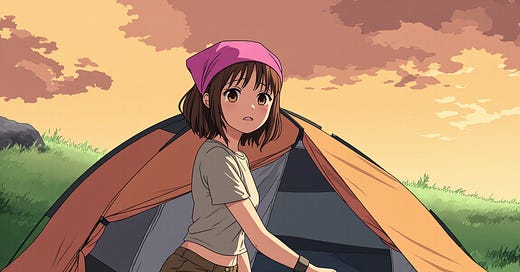



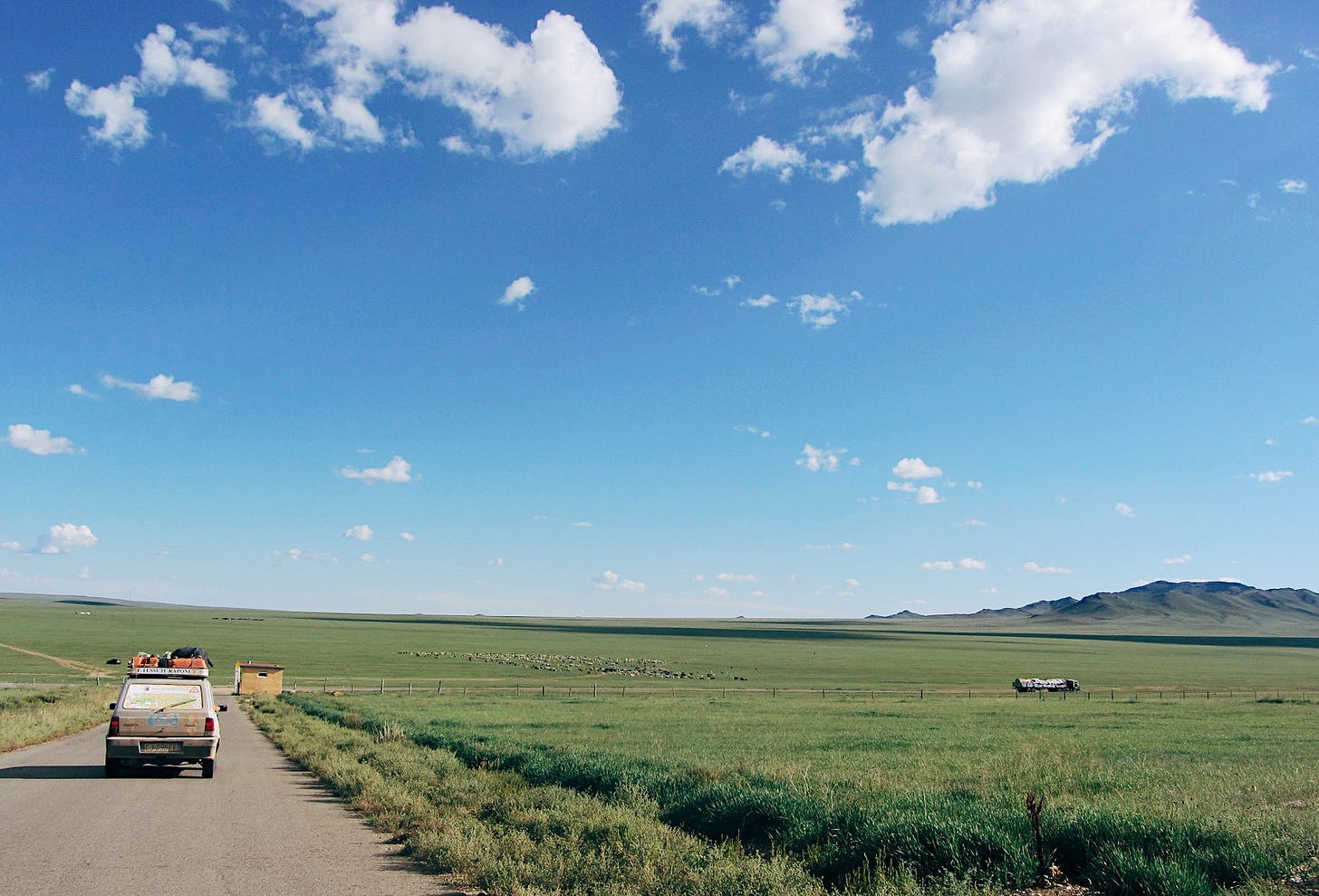
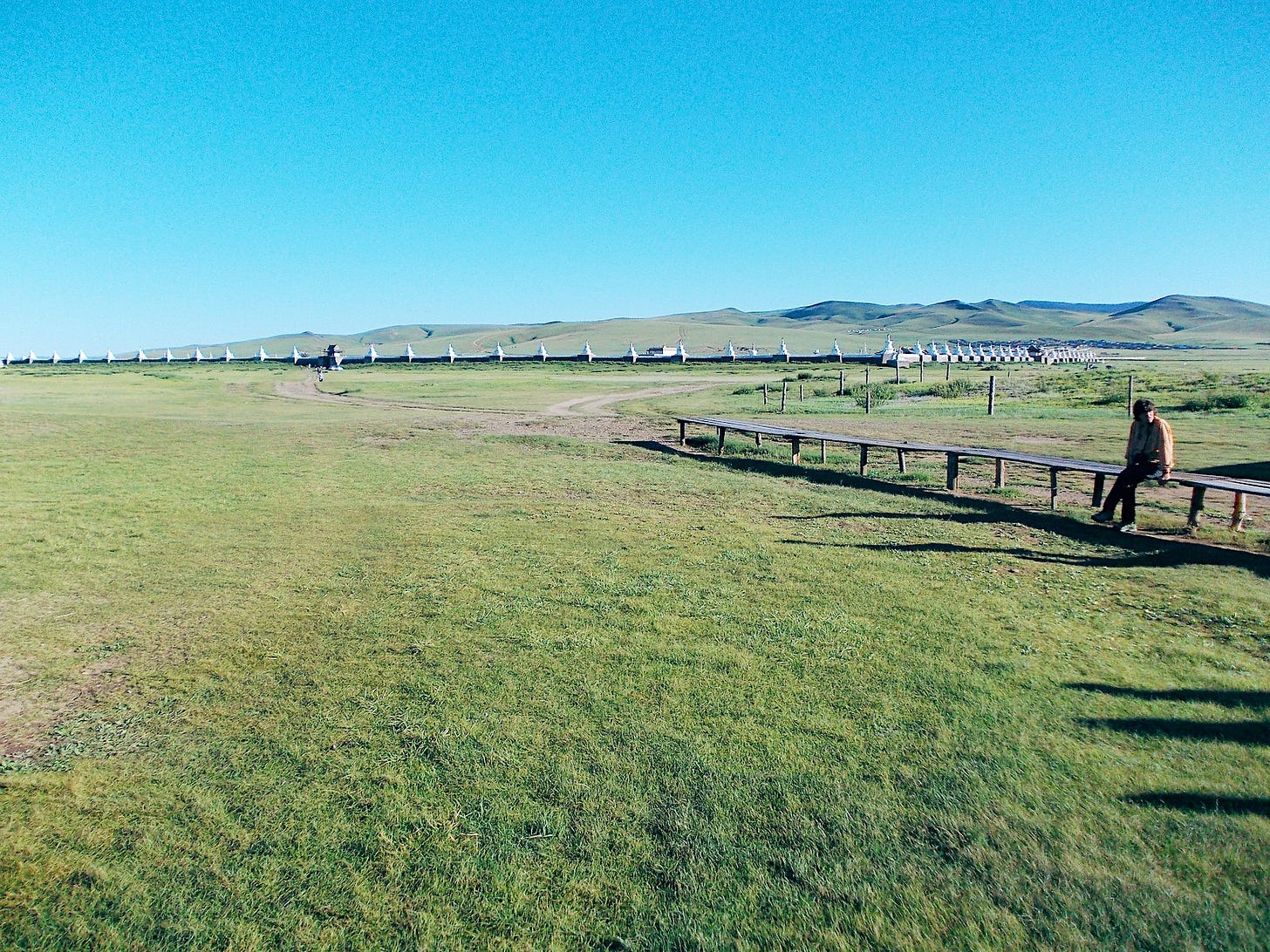
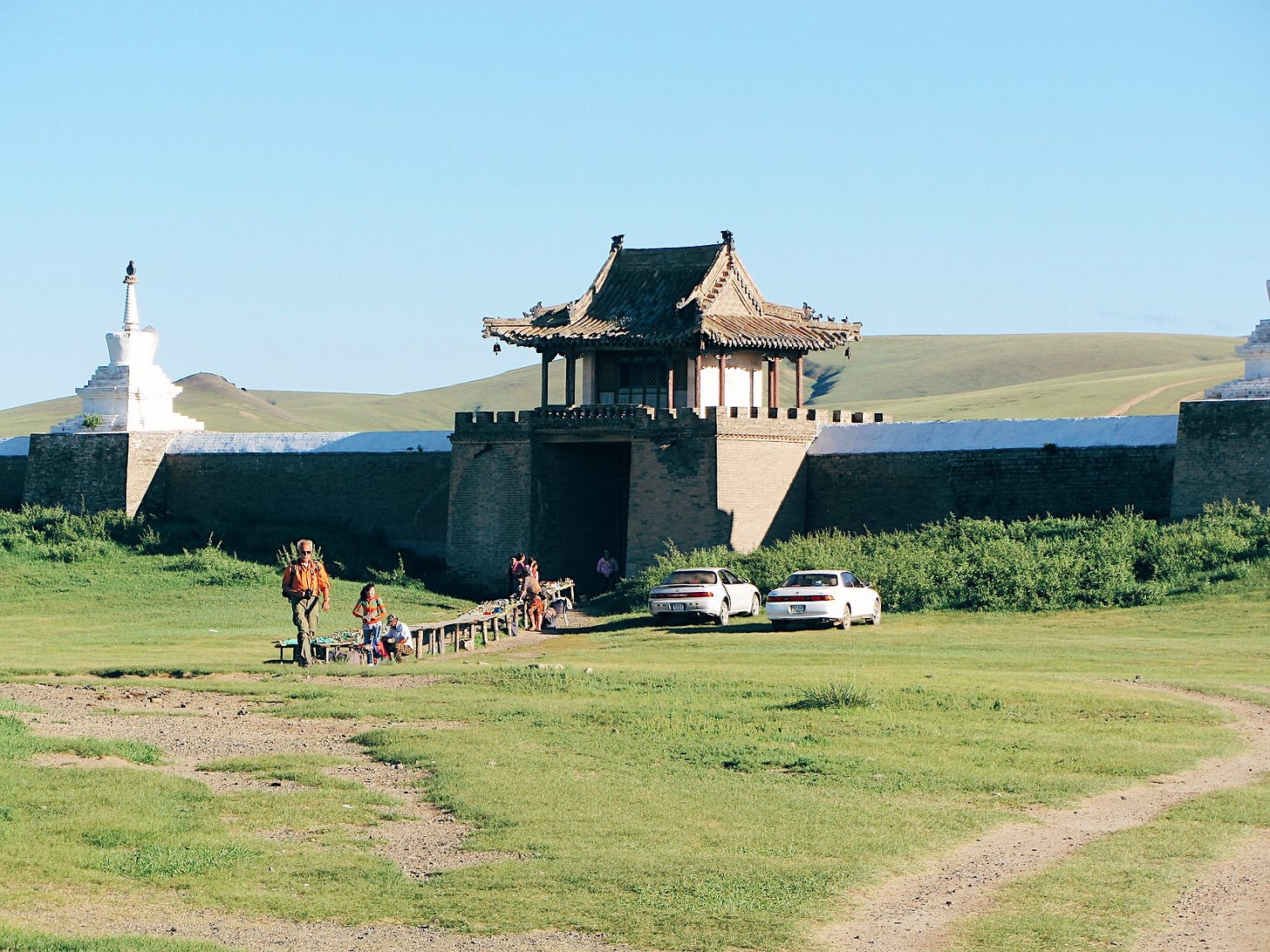

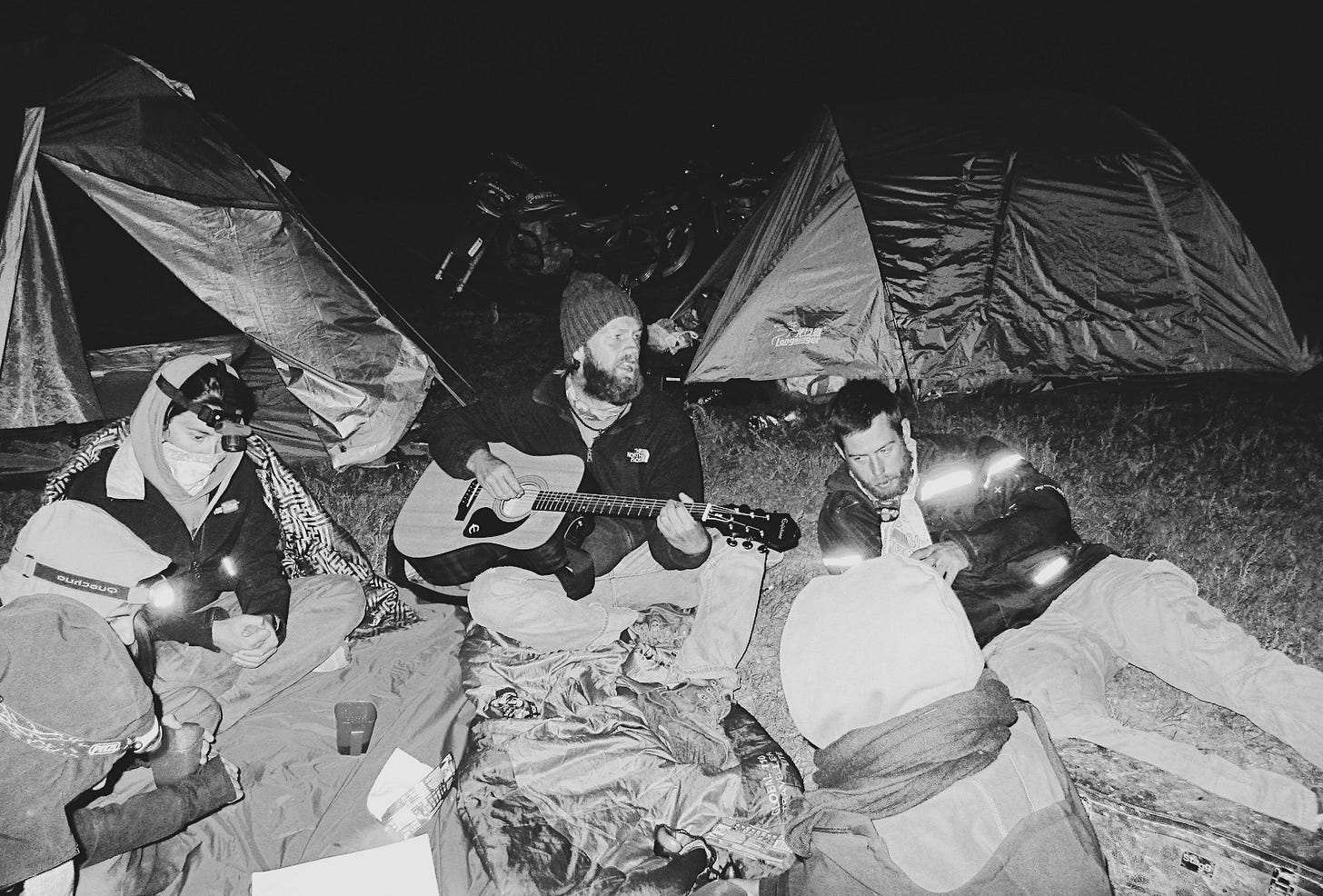
SUCH A THROWBACK!!! 🫶 and I stand by my position: They were not sketchy!! Or at least not more than any other usual suspect I decide to spend my evenings with while traveling :)
Che bel racconto!!! E mi sono anche commossa a pensarti con papà in questa straordinaria avventura che fai bene a ricordare, per ogni giorno un racconto. E le foto bellissime!!